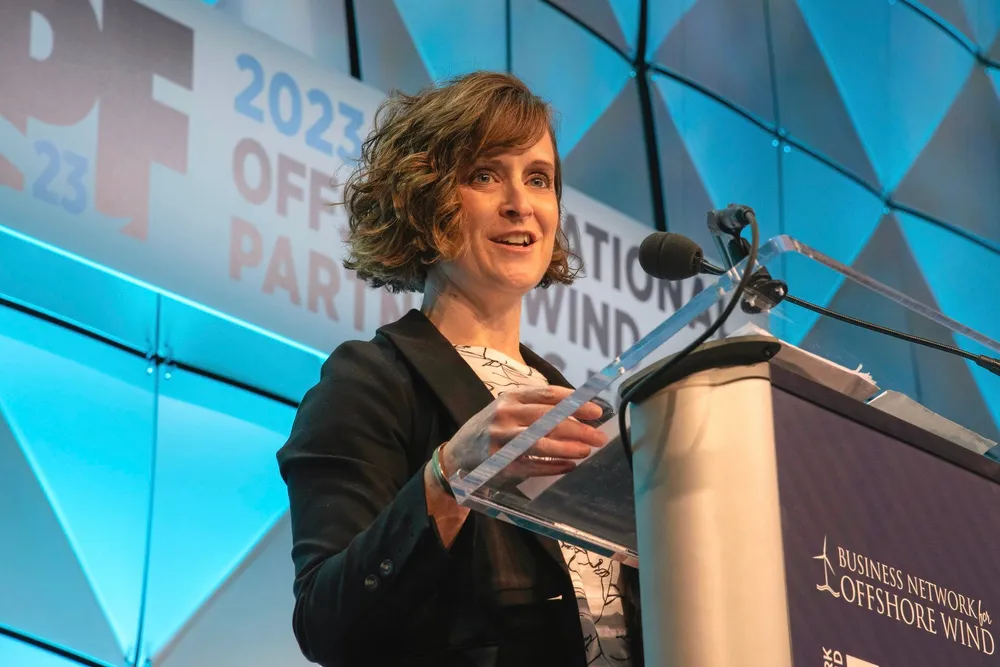Trump faces 'spirited challenge' over offshore wind says ex-top regulator
As director of BOEM, Elizabeth Klein shepherded almost 19GW to approval but new administration could undo that progress

Former top US offshore wind regulator Elizabeth Klein said that despite President Donald Trump’s efforts to sink the nearly 19GW industry she helped shepherd into existence, legal guardrails can still help shield it from executive interference.
As the industry anticipated, it was hit by Trump on his first day in office with an executive order (EO) banning new federal leasing or project permitting. He then went further by requiring federal reviews aimed at existing projects with an eye towards termination or modification.
Trump’s EO also enabled the Department of Justice to delay or settle litigation against project approvals. As virtually all US offshore wind arrays have attracted lawsuits, this move could potentially cripple the sector.
Yet, Klein struck a defiant tone over Trump’s sector attacks.
“I wouldn't expect that those projects are just going to pack up and decide, okay, we're not going to challenge this,” she said, predicting “spirited challenges to any attempt to not allow permitted projects to go forward.”
Klein stepped down in January with Trump’s inauguration, and her successor has yet to be named by the administration. Bureau of Ocean Energy Management (BOEM) lacked an appointed director for the entirety of his first term.
BOEM is a Department of Interior (DoI) agency which oversees energy development on the federally owned outer continental shelf and onshore lands.
Obama starts sector
Taking over at BOEM in January 2023, Klein brought extensive government experience, including six years in former President Barak Obama’s DoI where she rose to principal deputy secretary just as offshore wind was getting afloat.
Obama spearheaded sector development in the 2010s by putting in place a regulatory framework and holding initial lease sales off the East Coast.
This progress stalled during Trump’s first term, with BOEM rudderless and starved of personnel to handle permitting complexities of a new industry.
This changed dramatically under Biden, who set a 30GW by 2030 sector target central to his administration's climate and energy goals.
Klein didn’t oversee the greenlighting of flagship 800MW Vineyard Wind 1 and 132MW South Fork but did usher through roughly 18GW of project approvals.
Eleven projects have been consented led by Dominion Energy’s 2.6GW Coastal Virginia Offshore Wind array now in construction, as well as Orsted’s 704MW Revolution Wind.
Orsted’s South Fork is so far the only project in commercial operation, while CIP-Avangrid’s Vineyard I is expected to begin operation next year after lengthy delays due to a collapsed blade.
The accelerated pace of approvals was not dictated by fears of a second Trump presidency as many industry watchers assumed but rather the need to bolster public sentiment through tangible development, Klein said.
“Offshore wind projects can be very scary, in a way, to communities who don't know, what does this mean for us?” she observed.
Her tenure started just as industry momentum began to stall on surging inflation and interest rates but also declining public support.
Numerous whale strandings along Atlantic coastlines were blamed on sector activities, a claim rebutted by government and private sector scientists, while fisheries associations were strident in their industry opposition.
“The unknown drives a lot of opposition,” she added.
The need to get projects installed drove BOEM to seek ways to shrink its notoriously lengthy permitting timelines of nearly a decade.
“In this time where lots of people are talking about permitting reform… we were implementing, it was happening,” she said.
“We had identified the things that can be a challenge in getting projects approved, and we worked on fixing those problems.”
Permitting “often is a question of capacity. It’s just a person-heavy exercise,” she said, and BOEM’s efforts were fueled by funding provided by the landmark Inflation Reduction Act that enabled hiring as well as technical upgrades.
Permitting momentum sparked investment in manufacturing, ports and shipbuilding that now stands at some $24.5bn according to industry group Oceantic Network.
Demand growth not going away
This investment is now imperiled by Trump’s moves to downplay renewables while promoting fossil fuel extraction.
Still, Klein remains adamant that the industry will play a critical role in meeting the nation’s booming power demand.
“We're not going to fossil fuel our way out of what are some pretty serious energy demand issues blooming, particularly along the East Coast,” she said.
The US lead in artificial intelligence (AI) will depend on vast amounts of electricity, and demand is set to surge in critical markets including Northern Virginia, the world's largest data centre hub.
“If you care about national security, you should be supporting offshore wind. If you care about our looming energy supply-demand imbalance, you should care about offshore wind. If you want to drive energy costs down, you should be looking to offshore wind,” she said.
(Copyright)